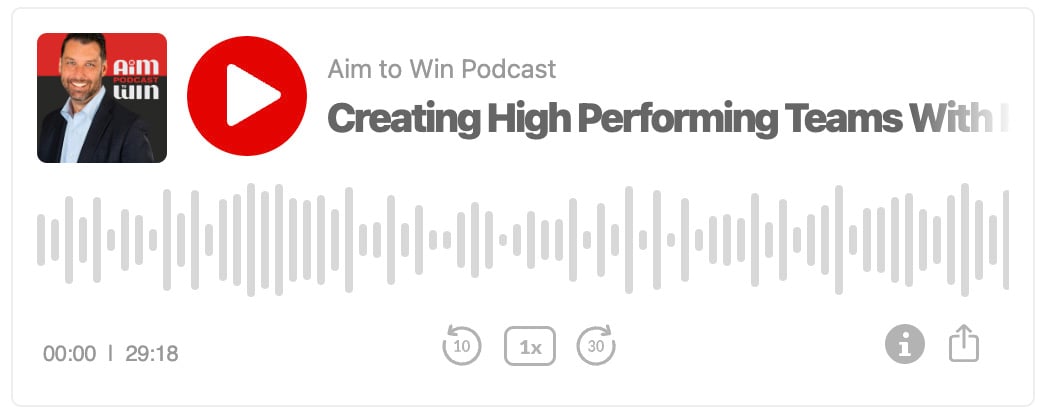Aim to Win Podcast with Wade Thomas
Renée Safrata is focused on creating high functioning and performing teams. Our chat shares what characteristics make up those qualities, where ego in leadership fits in, the importance of soft skills and why she thinks the future of teams is exciting!
6 Characteristics of High-Performing Teams
The first step to building a high-performing team is fixing the right people in the right roles. Leaders must also understand how each contributor will communicate with the rest of the team. As Renee explains, a team that collaborates on one clear purpose will drive business results. This, in turn, unlocks the potential value of individuals, increases their job satisfaction, and in the end, everyone wins.
Unfortunately, top-performing teams do not just ‘happen.’ Such teams are built on six key competencies that Renee describes are the core aspects for fostering stronger teams. The six are effective communication, accountability, emotional intelligence, interactive feedback, structures, and team cohesion. Of the six, communication is the glue that holds everything together, especially now that so many teams are working remotely.
Ego In Leadership
If you are like most people, you’ve certainly worked with someone with a big ego at some point in your career. Although strong-ego people are often dedicated individuals who care about quality and results, they often make collaboration impossible. According to Renee, ego is by far the biggest barrier to people collaborating effectively. First, egos erode effectiveness. Second, a combination of self-doubt and false pride due to an overactive ego gives strong-ego people a distorted image of their importance. So how can you bring order to a room full of high-ranking executives who all show signs of over-inflated egos? Renee believes the simplest way to get everybody on board is to make them focus on a common problem. People are selfish, and everybody wants to look after their own interests. Half the battle is understanding what motivates each stakeholder and getting people aligned on a singular problem.
Can Soft Skills Be Measured?
When it comes to skill measurements, most organizations focus on the so-called “hard skills.” They are curious about technical skills, professional certifications, or how well the individual can perform the tasks on the job posting. However, Rennee believes soft skills may be more important than hard skills. Having an employee with impressive professional qualifications but poor communication skills is a recipe for disaster. The not-so-good news is that quantifying soft skills is quite challenging because they primarily deal with interpersonal skills, abstract talents, and personality traits.
Recently, however, Renee and her team developed a system that measures soft skills and fully analyzes their impact on the business world. With the help of behavioral science, her team can efficiently analyze certain behaviors that indicate strong, soft skills development.
The Future of Teams
The future of teams is exciting. What we’re seeing now, especially in the fast-moving markets, is that traditional hierarchical structures are making way for agile teams that can respond swiftly to new challenges, innovate at speed, and solve problems. And this is where data comes in. Teams that make decisions based on analytics and data will be more successful in the future. Renee goes as far as to say basing business decisions on data can be the difference between success or failure for entire organizations. However, having data isn’t enough. The metrics you’re collecting need to be actionable and relevant to your organizational goals.
.png?width=125&height=61&name=Logo%20-%20Vivo%20Team%20-%20White%20(2).png)


